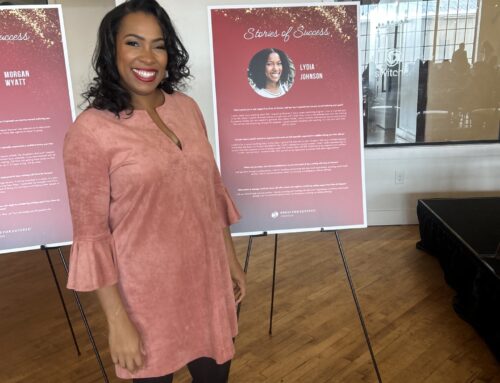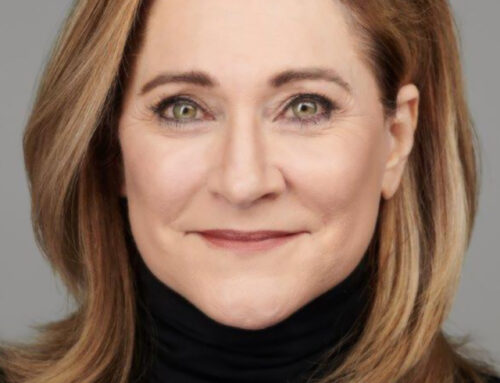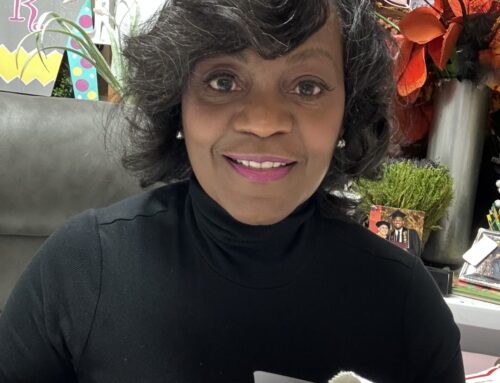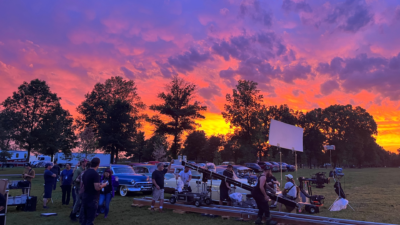 Dark clouds loomed over Oxmoor Farm as hundreds of extras in 1940s attire scattered for shelter. The storm that interrupted filming of “Queen of the Ring” last summer could have spelled disaster for the independent feature. Instead, it became a testament to the same spirit of determination that drove the film’s subject, wrestling pioneer Mildred Burke, to overcome seemingly impossible odds.
Dark clouds loomed over Oxmoor Farm as hundreds of extras in 1940s attire scattered for shelter. The storm that interrupted filming of “Queen of the Ring” last summer could have spelled disaster for the independent feature. Instead, it became a testament to the same spirit of determination that drove the film’s subject, wrestling pioneer Mildred Burke, to overcome seemingly impossible odds.
“Within 45 minutes, we had secured over a million dollar’s worth of equipment and moved 250 people to safety inside Oxmoor Mall,” recalls producer BD Gunnell. “There we were, all these people in period costume, waiting out a lightning storm in a modern shopping center.” It’s the kind of challenge that comes with independent filmmaking – and one that the production team handled with the same grit their protagonist showed decades ago.
A Legend Comes to Life
“Queen of the Ring” tells the extraordinary true story of Mildred Burke, a single mother who defied convention to become the first million-dollar female athlete in history. Set in an era when women’s wrestling was illegal across most of the United States, the film follows Burke’s journey from a small-town waitress to a three-time world champion who held her title for nearly two decades.
Emily Bett Rickards brings Burke’s story to vivid life in what The Hollywood Reporter calls a “breakout performance.” Opposite her, Josh Lucas portrays Billy Wolfe, Burke’s promoter-turned-husband whose complex relationship with the champion forms the heart of the film’s personal drama. The stellar cast includes Tyler Posey, Walton Goggins, Gavin Casalegno, and Francesca Eastwood as fellow wrestling legend Mae Young.
Louisville’s Star Turn
While Burke’s story spans the nation, Louisville provides the perfect backdrop for this period piece. The city’s historic architecture offers an authentic window into the past, with iconic locations like Louisville Palace, Seelbach Hilton Hotel, Headliners Music Hall, and The Brown Hotel featured prominently throughout the film.
“Louisville’s rich wrestling history made it the ideal location,” explains Gunnell. “Ohio Valley Wrestling (OVW) was instrumental in preparing our actors for their roles.” The local wrestling promotion, known for launching the careers of stars like John Cena and Dave Bautista, helped ground the film in authentic wrestling tradition.
Breaking New Ground
Just as Burke fought to legitimize women’s wrestling in the 1930s and ’40s, “Queen of the Ring” breaks new ground in storytelling. “Mildred Burke wasn’t just fighting opponents in the ring—she was battling an entire system designed to keep women sidelined,” Gunnell explains with passion. “What makes her story so compelling is that she refused to accept the word ‘no.’ When wrestling was illegal for women, she did it anyway. When she was told she couldn’t headline, she proved them wrong. Her story isn’t just inspirational—it’s a masterclass in audacious determination that feels just as relevant today as it did 80 years ago.”
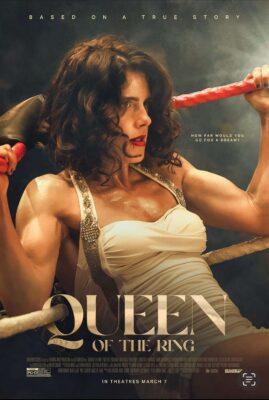
The film has already garnered significant acclaim on the festival circuit, collecting an impressive array of awards. “Queen of the Ring” took home the Festival Award for Best Feature Film at the Twin Cities Film Festival, while director Ash Avildsen won Best Director honors at both the Portland Film Festival and Saint Augustine Film Festival (where he also received the coveted Audience Award). The Fort Lauderdale International Film Festival recognized the film’s breakthrough performances, awarding Emily Bett Rickards, Francesca Eastwood, and Gavin Casalegno with their prestigious ‘Star on the Horizon’ Award. As Gazettely notes in their review, the film “goes beyond the traditional sports biopic, presenting a powerful narrative about societal transformation and one amazing woman’s journey.”
A Community Effort
The production brought together talent from across the region, with crew and background actors drawn from Kentucky and southern Indiana. Local businesses and organizations, including 502Film and the NULU business association, rallied to support the production.
Creating a period-authentic world from Louisville’s modern landscape presented a fascinating challenge. “Transforming 2023 into the 1940s is like solving a cinematic puzzle,” Gunnell reveals. “We hunted for perfect angles that erased modern elements and choreographed our wrestling sequences to create the illusion of packed arenas without the budget for a thousand extras. The magic happened when our cinematographer’s lighting merged with the artistry of our costume and set designers. When you see the Seelbach Hotel or Louisville Palace on screen, you’re not seeing a set—you’re witnessing a time machine built from Louisville’s architectural treasures.”
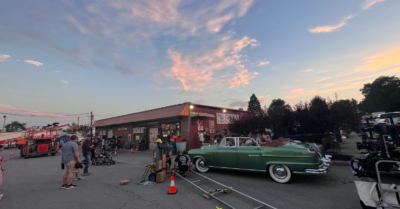
Louisville’s Enthusiastic Response
The film has already found a passionate audience in Louisville, where advanced screenings on February 25th sold out so quickly that organizers had to add a second showing – which also filled up within hours.
“We are so grateful for the support of the Louisville community,” says Gunnell. “Their enthusiasm confirms what we’ve always believed: that Mildred Burke’s story resonates deeply with audiences who recognize the power of determination and the importance of breaking barriers.”
A Timeless Message
At its core, “Queen of the Ring” is more than a sports movie or a period piece – it’s a testament to the power of determination and integrity. As Mildred Burke challenged the status quo of her era, she opened doors for generations of women who would follow. Her story reminds us that some battles are worth fighting, no matter the odds.
“Queen of the Ring” opens nationwide on March 7th at AMC and Regal cinemas across the country, with select Cinemark Theaters also showing the film. Audiences everywhere will have the opportunity to experience this remarkable story of female empowerment and perseverance. You can pre-order tickets at the Queen of the Ring website

